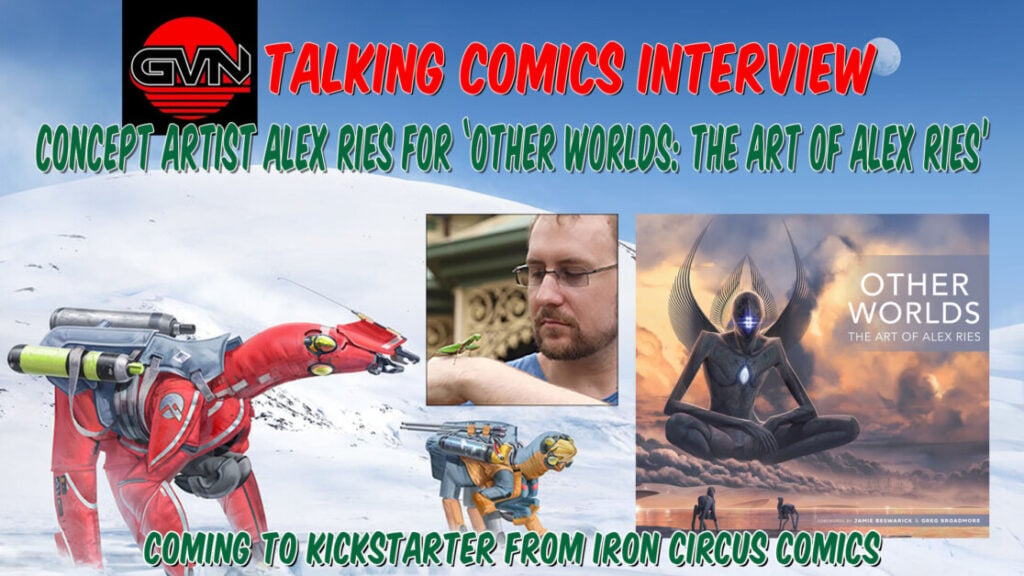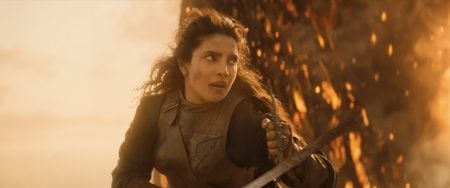Alex Ries
Alex Ries is a conceptual artist with a vision that combines imagination with attention to detail that might make those in the scientific community envious. Many of his creature and mechanical works, whether they be for film or video games, maintain the possibility of being based in fact. None more so than in his brilliant work on the video game Subnautica: Below Zero by Unknown Worlds Entertainment.
Other Worlds: The Art of Alex Ries
Through his career, he has produced a high volume of imaginative and well received conceptual art. By both his employees and his fans. Coming soon, Spike Trotman and Iron Circus Comics will be bringing an impressive collection of Alex’s paintings and drawings in the new book: Other Worlds: The Art of Alex Ries. A 300+ page hardcover that will include forewords by Jamie Beswarick and Greg Broadmore and extensive commentary from the artist himself. OTHER WORLDS: THE ART OF ALEX RIES will be available via Kickstarter.
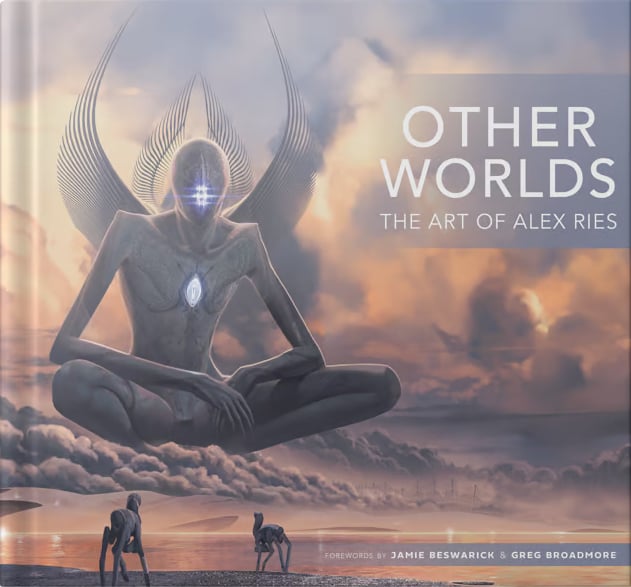
In preparation for the new campaign, we were fortunate enough to corral the talented artist to find out about his beginnings, his artistic process, and of course his upcoming book. So, let’s welcome renowned concept artist Alex Ries to GVN Talking Comics.
Origins
GVN: Thank you for sharing a little of your time, Alex. Since this is our first chance to chat,
let’s start with some of your artistic beginnings. When did you first take an interest in art
and whose work inspired you to pursue that challenge?
AR: I have been interested in art for as long as I can remember: my school workbook borders (and sometimes the books themselves…) were full of doodles and designs. As far as pursuing it as a career, that came sometime later, in high school, as I realized art was a way I could communicate with people. The work of Wayne Barlowe, creator of Barlowe’s Expedition, and James Gurney’s Dinotopia played big roles, as did the precise illustrations found in books like Incredible Cross Sections and the magazine Australian Geographic; I was drawn to illustrators with an eye for detail.
Art Mixed with Science
GVN: Your conceptual art mixes imagination with anchors in biology, sea life, and mechanical
constructs. Was this the direction you took from the beginning, or did you evolve as you
studied more and honed your artistic craft?
AR: It was always my direction, really; my childhood goal for a long time was to be a scientist (I wanted to be the first person to film a giant squid; I missed that boat). I kept that love of science as I became an artist, and it informs what I create to this day. My focus on sea life is rooted in my childhood; many of my most precious memories are my time searching for the wonderful creatures hiding in tide pools in Mallacoota and Inverloch in Southeastern Australia.
I was also (and remain) a little obsessed with aviation; I designed, built and sometimes flew model aircraft on the family farm. Mix all this in with my love of science fiction, and those ideas became alien creatures and their flying machines.
Traditional and Digital Art
GVN: Speaking of your art, you have done both traditional and digital in your works. Was
making the transition to digital easy for you and what software do you generally use in
your work?
AR: I worked exclusively traditionally through most of school, and then in a hybrid way through college and my early career; while with THQ I would often design on paper, then scan and color digitally. But really, once I got my first drawing tablet I was set on the digital path, and I work essentially entirely digitally now. The transition was quite quick, as digital art offered SO many options to design on the fly. I work in Photoshop for the most part, where I developed my skill set. I also 3D model in zBrush and Blender to create more complicated subjects for paintovers, and I have been enjoying Procreate.
Attention to Detail
GVN: Part of MY fascination with your art is the amount of detail and research you appear to
put into it. Even the most fantastical creatures seem to have some basis in reality. Have you
always been detail-oriented or has that too been an evolution in your work?
AR: I have become more detail oriented as I have developed as an artist, I think. Many of my projects, particularly on the Birrin Saga, have become increasingly rooted in my understanding of real science, at least as far as how the creatures themselves and their machine’s function. In Subnautica, a series that balances realistic, humorous and sometimes frightening elements, I work in my understanding of evolutionary principles.
Even my more fantastical art, like Contact and its giant otherworldly human figure, has at least a ‘soft’ scientific explanation of how and why it works in my head.
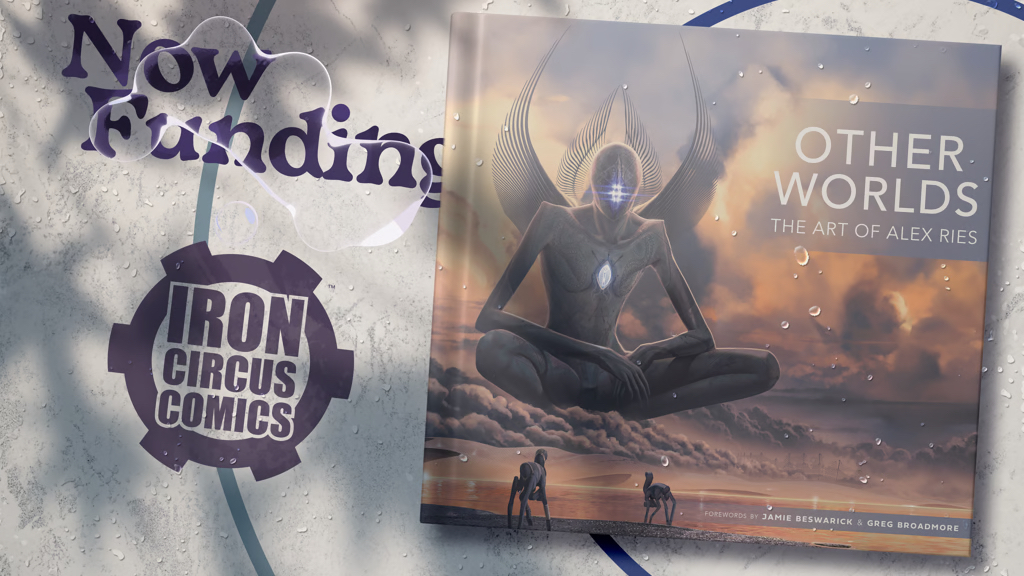
Connecting with Iron Circus
GVN: Your upcoming book “Other Worlds: The Art of Alex Ries” is coming to Kickstarter
through Spike Trotman’s Iron Circus Comics. How did this collaboration come about and
are you familiar with the crowdfunding process? (It’s been proven time and again that
Spike and Iron Circus have the process nailed down.)
AR: It was an interesting route to this collaboration! I found my first agent, Anne Perry, via Twitter, and she and I pitched a narrative illustrated book called Two Sky River, a book set in my Birrin universe, and Iron Circus was interested!
It turned out that not only was Spike, the founder, familiar with my work but I had been following her Comic art for well over a decade and we both already knew of each other… While we work on Two Sky River, we developed Other Worlds to compile the decades of collected work I had created. I have great trust in Iron Circus to guide me through this process, as this will be my first crowdfunding project to date.
3D Representation
GVN: Looking through your book, I was struck by the sculpted pieces reflecting your
creations. Have you always been involved in doing 3D representations of your art? As a
concept artist, it seems to go hand in hand.
AR: My first physical models were aircraft kits and Lego, and I was rather slow to embrace 3D software, until my more recent forays into zBrush and Blender. The birrin sculpture I photographed for my book is the only physical one I ever made. It took months of research, learning and crafting to create the piece in Super Sculpey, created after work hours.
I have found 3D invaluable for planning and laying out certain complex designs and helping sell a concept. But I still prefer the look and ‘feel’ of 2D art; indeed, most of the artworks I collect are paintings, photographs or illustrations. I expect to keep using 3D as an important tool to aid my work as a 2D artist, rather than replacing it.
Kickstarter Campaign
GVN: I want to thank you again for talking with us, Alex. Before I let you go, let me give you
one last moment to talk about your upcoming book and its Kickstarter campaign.
AR: This book is the culmination of decades of work, from my beginnings as a traditional artist, through to creatures I designed for Subnautica: Below Zero and the Birrin Saga. I have packed it full of not just art but my design process and breakdowns of how I create my work (lots of process art).
I have the entire evolution of the birrin project, and a great deal of early art from that world (including much I am developing for Two-Sky River). This is my first ever book, and I have made it the book I would have wanted. No half measures, no filler.
If you love science and science fiction, the creatures of the Subnautica universe, and the possibilities of life and civilisations on other worlds, this is that book.
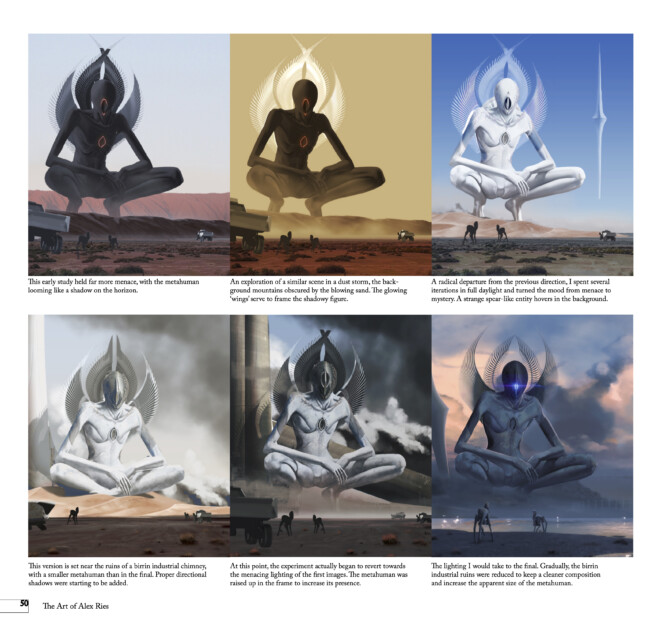
Iron Circus Comics ‘Other Worlds: The Art of Alex Ries’
Other Worlds: The Art of Alex Ries opens its Iron Circus Comics Kickstarter Campaign on October 21st at 12:00 noon EST (9:00 am PST).

Senior Writer at GeekVibesNation – I am a 60 something child of the 70’s who admits to being a Star Trek/Star Wars/Comic Book junkie who once dove headfirst over a cliff (Ok, it was a small hill) to try to rescue his Fantastic Four comic from a watery grave. I am married to a lovely woman who is as crazy as I am and the proud parent of a 21-year-old young man with autism. My wife and son are my real heroes.


